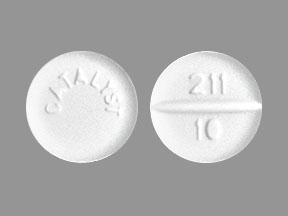Firdapse Side Effects
Generic name: amifampridine
Medically reviewed by Drugs.com. Last updated on Oct 1, 2023.
Note: This document contains side effect information about amifampridine. Some dosage forms listed on this page may not apply to the brand name Firdapse.
Applies to amifampridine: oral tablet.
Serious side effects of Firdapse
Along with its needed effects, amifampridine (the active ingredient contained in Firdapse) may cause some unwanted effects. Although not all of these side effects may occur, if they do occur they may need medical attention.
Check with your doctor immediately if any of the following side effects occur while taking amifampridine:
More common
- Arm or leg pain
- bladder pain
- bloating or swelling of the face, arms, hands, lower legs, or feet
- bloody or cloudy urine
- blurred vision
- burning, crawling, itching, numbness, prickling, "pins and needles", or tingling feelings
- chest pain or tightness
- chills
- cough
- cough producing mucus
- diarrhea
- difficult, burning, or painful urination
- difficulty breathing or swallowing
- dizziness
- fever
- frequent urge to urinate
- general feeling of discomfort or illness
- headache
- hoarseness
- joint pain
- loss of appetite
- lower back or side pain
- muscle pains, spasms, or weakness
- nausea
- nervousness
- pounding in the ears
- rapid weight gain
- runny nose
- shivering
- slow or fast heartbeat
- sneezing
- sore throat
- sweating
- swollen, painful, or tender lymph glands in the neck, armpit, or groin
- trouble sleeping
- unusual tiredness or weakness
- unusual weight gain or loss
- vomiting
Other side effects of Firdapse
Some side effects of amifampridine may occur that usually do not need medical attention. These side effects may go away during treatment as your body adjusts to the medicine. Also, your health care professional may be able to tell you about ways to prevent or reduce some of these side effects.
Check with your health care professional if any of the following side effects continue or are bothersome or if you have any questions about them:
More common
- Back pain
- blindness
- constipation
- decreased vision
- discouragement
- falls
- feeling cold
- feeling sad or empty
- heartburn
- irritability
- lack or loss of strength
- loss of interest or pleasure
- pale skin
- stomach pain
- trouble concentrating
- trouble breathing
- unusual bleeding or bruising
For Healthcare Professionals
Applies to amifampridine: oral tablet.
Hematologic
Common (1% to 10%): Lymphadenopathy[Ref]
Immunologic
Common (1% to 10%): Viral infection[Ref]
Musculoskeletal
Very common (10% or more): Back pain (14%), muscle spasm (12%), muscle weakness (10%), pain in extremity (10%)
Common (1% to 10%): Blood creatine phosphokinase increased[Ref]
Ocular
Very common (10% or more): Cataract (10%)
Frequency not reported: Blurred vision[Ref]
Metabolic
Common (1% to 10%): Peripheral edema
Uncommon (0.1% to 1%): Hypercholesterolemia[Ref]
Psychiatric
Common (1% to 10%): Insomnia, depression
Frequency not reported: Sleep disorders, anxiety[Ref]
Genitourinary
Common (1% to 10%): Urinary tract infection[Ref]
Hepatic
Very common (10% or more): Elevated liver enzymes (e.g., elevated alanine aminotransferase [ALT], aspartate aminotransferase [AST], lactate dehydrogenase [LDH], gamma-glutamyl transferase [GGT] (14%)
transferase (GGT)[Ref]
Respiratory
Very common (10% or more): Upper respiratory tract infection (33%)
Common (1% to 10%): Bronchitis, dyspnea, influenza
Frequency not reported: Bronchial hypersecretion, asthma attack in asthmatic patients or patients with a history of asthma, cough[Ref]
Other
Common (1% to 10%): Fall, pyrexia[Ref]
Nervous system
Very common (10% or more): Paresthesia/dysesthesia (i.e., oral paresthesia, oral hypoesthesia) (69%), headache (14%), dizziness (10%), asthenia (10%)
Common (1% to 10%): Seizures[Ref]
Cardiovascular
Very common (10% or more): Hypertension (12%)
Frequency not reported: Raynaud's syndrome, cardiac rhythm disorders, palpitations[Ref]
Dermatologic
Very common (10% or more): Hyperhidrosis, cold sweat
Common (1% to 10%): Erythema[Ref]
Gastrointestinal
Very common (10% or more): Abdominal pain (14%), nausea (14%), diarrhea (14%), dyspepsia (17%)
Common (1% to 10%): Constipation, GI reflux
Frequency not reported:: Epigastralgia[Ref]
Frequently asked questions
- What is the difference between Ruzurgi and Firdapse?
- What is Firdapse (amifampridine) used to treat?
More about Firdapse (amifampridine)
- Check interactions
- Compare alternatives
- Pricing & coupons
- Reviews (3)
- Drug images
- Latest FDA alerts (1)
- Dosage information
- During pregnancy
- FDA approval history
- Drug class: cholinergic muscle stimulants
- Breastfeeding
- En español
Patient resources
Other brands
Professional resources
Other brands
Related treatment guides
References
1. Product Information. Firdapse (amifampridine). Catalyst Pharmaceuticals, Inc. 2018.
2. Product Information. Ruzurgi (amifampridine). Medunik Canada. 2021.
Further information
Always consult your healthcare provider to ensure the information displayed on this page applies to your personal circumstances.
Some side effects may not be reported. You may report them to the FDA.

